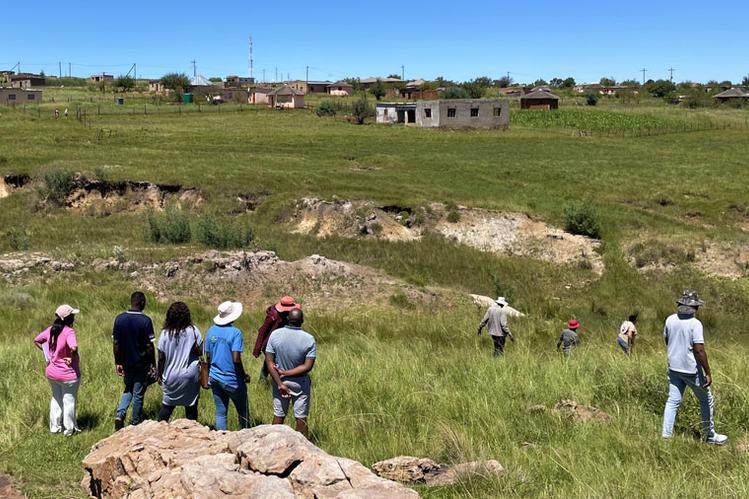
PhD in Rural Studies (Thesis/Research)
Support sustainable rural communities and landscapes.
The PhD in Rural Studies is offered through our School of Environmental Design and Rural Development (SEDRD) and provides opportunities for advanced studies and research on the integration of socio-cultural and bio-physical components of capacity development, design, or planning of landscape systems and rural communities.
The Rural Studies doctorate focuses on two fields: sustainable rural communities and sustainable landscape systems. Both fields contribute research to support the long-term well-being of rural communities through the integration of economic, social and environmental factors in their planning and activities.
World-class faculty
Tap into the knowledge of SEDRD faculty and other U of G departments, including Food, Agriculture and Resource Economics, Geography, Political Science, and Sociology and Anthropology.
Local and global
Focus your research on local, Canadian or global rural communities and landscapes to strengthen your credibility in the areas you wish to focus your career.
Improve lives
Investigate issues and potential responses that broadly or pointedly affect rural communities and landscapes (community development, sustainability, social enterprises, food systems and rural policy).
Unique in Canada
Add unique experience to your resume by learning in the only rural studies PhD program in Canada.
Interdisciplinary research
Integration of a multidisciplinary approach to integrate a variety of subject areas to explore a wide variety of research areas.
Virtual classes
All courses are offered virtually to enable the inclusion of students who are balancing various demands, such as family and full time employment, or are studying internationally.
The program offers Fall admission, full or part-time study, with a thesis requirement. All courses in the PhD Rural Studies are delivered virtually via Zoom or Teams.
- Sustainable Rural Systems I & II (required)
- Integrative Research Methods I & II (required)
Additional courses may be required by the student's Advisory Committee. Make-up courses may be required prior to admission to the PhD program or early in the program. All courses will normally be completed prior to the qualifying examination. All or most of the courses should be taken in the first year of study.
This is just a sample of the course options. View all Rural Studies graduate courses here.
Students conduct research that leads them to careers in Canada and internationally. They find leadership positions in federal governments, non-governmental organizations (NGO), academia, and environmental consulting. Graduates become leading specialists in addressing sustainable landscapes and issues related to rural communities. Sample careers and employers include:
- Consultant, director, researcher, senior civil servant, professor
• PhD students receive a minimum stipend of $ 24,710 per year
More details on funding your graduate studies are available on the Graduate & Postdoctoral Studies website.
Many Rural Studies students also compete successfully for University of Guelph scholarships and awards.

More information on courses and admission requirements can be found here.
Meet Your Profs
How to Apply
The program's admission policy is governed by the availability of graduate advisors and other resources. The Rural Studies Program admits applicants from a wide variety of disciplines and backgrounds which greatly enhances the multidisciplinary approaches in the program. The program also seeks to achieve the significant participation of women and Indigenous people.
More details on the U of G graduate program application process here.
As part of the application requirements, you are required to secure a faculty advisor to supervise your program. Applying without first having communicated with a potential advisor is not recommended.
Our SEDRD faculty profiles describe research programs in more detail. Contact the faculty member you are interested in working with to discuss potential research opportunities. We recommend connecting via email. To determine advisor availability applicants can also contact the Rural Studies Program Coordinator.
- Applicants must have a master’s degree (or the equivalent) from a recognized university in the humanities, social-science, or applied-science disciplines.
- Master's graduates in a range of humanities, social-science and applied-science disciplines are eligible for consideration for admission. As examples, master's graduates in geography, sociology, planning, environmental science, rural extension studies and international development may be particularly suitable. Applicants who have not completed courses relevant to rural studies or gained experience in rural communities may be required to do so prior to admission or as part of initial phases of the PhD program.
- Admission to the doctoral program requires a satisfactory baccalaureate and at least high second-class honours (‘B’ standing) in a recognized master’s program.
- Secured a faculty advisor
- A completed PhD Rural Studies Admission Questionnaire form
- Statement of Interest
- Your statement of research interest (separate from the one requested within the on-line application form) should outline: your career goals; the particular area of research you wish to pursue at the University of Guelph (what is it you want to research?); and its relationship to SEDRD faculty expertise.
- Good academic standing alone will not guarantee entry to the Program. One of our faculty members must be interested in, and willing to supervise your research. It is therefore important that you state your research interests and goals clearly and succinctly.
- Resume
- Please provide a current resume that gives a profile of your background and experience.
- Work experience in a related setting is also considered especially useful in applying theory to practice and to identify research needs and topics.
- Please be aware that any material collected towards a graduate application, (for example transcripts, reference letters, etc.) must be dated within the past year. Any material dated prior to a year from the application date will not be accepted.
- Your application is not considered complete until all of these documents have been received.
- July 1st for Fall semester entry (for domestic students)
- April 15th for Fall semester entry (for international students)
- If you wish to apply after this deadline, please contact the Graduate Coordinator or the Graduate Program Assistant.
More details on the U of G graduate program application process here.
-
Securing a Study Permit:
- To study in Canada, all students must apply for a Study Permit at the nearest Canadian Embassy, High Commission or Consulate. A student authorization is commonly called a student visa. For you to be considered for a student visa, the Canadian immigration officer will need to see your letter of acceptance from the University of Guelph, proof of citizenship and proof of funds for one academic year.
- The University of Guelph and Immigration Canada expect international students to have enough funds for the duration of their study in Canada, and especially during their first year. The issuance of a student visa is strongly based on your ability to finance your education. The student visa is usually issued for the duration of your academic program.
- Please note that you will not be allowed to register at the University of Guelph if you do not have a valid Study Permit.
- If your first language is not English, and you do not have a degree from an English speaking University, you must provide an official English Testing score from an acceptable source. Please refer to the Office of Graduate Studies website for the required English Language Proficiency acceptable tests and required scores.
- Please use this guide to compare your academic credentials and determine the grade equivalency needed.
- More resources for international applicants are available on the U of G Graduate & Postdoctoral website.
Contact
For questions on applying and admissions:
Lorena Barker, SEDRD
rsphd@uoguelph.ca
519-824-4120, Ext. 56780
For questions on program options:
Leigh West, Ontario Agricultural College (OAC)
lewest@uoguelph.ca
519-824-4120 Ext. 52101
Hear from Rural Studies Graduate Students

Choosing SEDRD was a natural extension of my previous training in public policy and community development and places me at the heart of an institution that is recognized as a leader in rural research, providing access to previous research and crucial opportunities to liaise with decision- and policy-makers in Canada and abroad.







